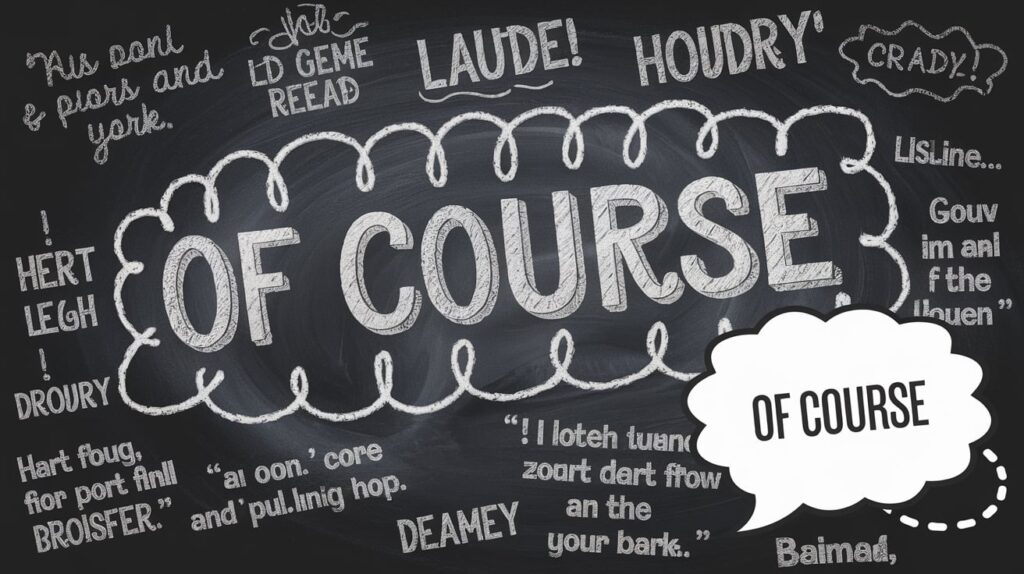Which One Should You Use?
In the intricate world of the English language, even slight variations can lead to significant misunderstandings. One phrase that frequently causes confusion is of course or ofcourse.
Many people mistakenly write it as “ofcourse,” raising questions about its usage, meaning, and context. This article will dive deep into the nuances of “of course” or “ofcourse,” clarifying their meanings, exploring their origins, and providing practical examples to help you use them correctly. By the end, you’ll have a solid understanding of which term to use and why it matters in effective communication.
Why is There Confusion?
The confusion surrounding “of course” or “ofcourse” primarily stems from several factors. Understanding these elements will help you avoid common pitfalls and enhance your writing.
read more : Use of Witness or Witnesses – Grammar Beacon

Misinterpretation of Spaces
The English language often presents challenges with compound words and phrases. The phrase “of course” is frequently miswritten as “ofcourse” due to a misunderstanding about the spacing.
English is filled with compound words, but “of course” is not one of them. This oversight is common among writers who may not be fully aware of the rules governing spacing and phrasing.
Lack of Awareness
Another contributing factor is a general lack of awareness regarding proper English usage. Many individuals use “of course” in spoken conversation without considering its written form.
This lack of attention to detail can lead to mistakes when transitioning from speaking to writing, especially in informal settings where the pressure to produce quickly can overshadow the need for precision.
read more : Hoodie or Hoody – Grammar Beacon
Common Usage Patterns
In everyday conversation, people often say “of course” without hesitation, which can create an assumption that it can be casually written in the same manner.
However, written communication demands a higher level of scrutiny, particularly when it comes to clarity and professionalism. Using “ofcourse” can lead to misunderstandings and potentially damage your credibility.
What Do “Of Course” and “Ofcourse” Mean?
“Of Course”
The phrase “of course” is widely recognized as an expression used to denote something that is obvious, expected, or agreeable. It often serves to confirm an idea or respond positively to a question or request. This phrase embodies an affirmative tone that can enrich communication.
- Example: When someone asks, “Are you going to the party?” a reply of “Of course!” not only confirms attendance but also conveys enthusiasm.
“Ofcourse”
Conversely, “ofcourse” is simply an incorrect spelling of “of course.” It lacks any meaningful definition in standard English and can create confusion or diminish the professionalism of your writing. To maintain clarity and credibility, it’s essential to avoid using “ofcourse” entirely.
read more : The Past Tense of Meet – Grammar Beacon

Synonyms and Similar Terms to “Of Course”
If you want to convey a similar sentiment without relying too heavily on “of course,” consider these synonyms:
- Certainly
- Absolutely
- Naturally
- Sure
- Without a doubt
These alternatives can add variety to your vocabulary while maintaining the original intent of your message. Using synonyms also allows for a more nuanced expression, which can enhance the quality of your writing.
When and How to Use “Of Course”
Context Matters
Using “of course” is appropriate in various contexts, from casual conversations to formal writing. Understanding when and how to use it effectively is crucial for clear communication.
Everyday Conversations
In everyday dialogues, “of course” serves as a polite acknowledgment or affirmation. It’s a way to express agreement without sounding overly formal.
- Example: “Do you want to grab dinner later?” “Of course!”
This response indicates eagerness and openness to the suggestion, making it a friendly and approachable way to engage.
read more : the Past Tense of Swing – Grammar Beacon
Formal Communication
In formal writing, using “of course” can soften statements or add a polite tone, making your message more palatable to the reader.
- Example: “Of course, I will ensure the report is submitted by the deadline.”
Here, the phrase not only conveys commitment but also reflects a professional demeanor, which is especially important in business communication.
Scenarios to Illustrate Usage
Let’s explore a couple of scenarios that illustrate the proper use of “of course.”
Scenario 1: Agreeing to Help
Imagine your friend asks, “Can you help me move this weekend?” You might reply, “Of course! I’d love to help.” In this case, your response not only confirms your willingness but also conveys a friendly and supportive tone.
Scenario 2: Acknowledging an Obvious Fact
During a discussion about the weather, someone might comment, “It’s raining today.” You could respond, “Of course, it’s fall!” This statement highlights the obviousness of the situation while keeping the conversation engaging.
read more : Skill-Set vs Skillset – Grammar Beacon

Potential Misuses of “Of Course”
While “of course” is versatile, it’s important to be aware of situations where its use may not be appropriate. For instance, using it to express uncertainty can lead to confusion.
- Incorrect Usage: “Of course it might rain tomorrow.”
In this context, the use of “of course” is misleading because it implies certainty when the speaker is actually uncertain. Instead, a phrase like “It’s possible that it might rain tomorrow” would be more appropriate.
Examples of ‘Of Course’ in Sentences
To further clarify the usage of “of course,” here are additional practical examples:
- “Of course, I’ll help you with your project.”
- “Is the store open today?” “Of course! It’s open every day.”
- “Of course, we need to finish this project before the deadline.”
- “Are you attending the meeting?” “Of course! I wouldn’t miss it.”
These examples showcase how “of course” can affirmatively respond to inquiries or statements in both casual and formal contexts.
The Importance of Contextual Awareness
Being mindful of the context in which you use “of course” can significantly affect the effectiveness of your communication. In professional settings, a well-placed “of course” can enhance your credibility, while in casual conversation, it can foster camaraderie and friendliness.
Origins of “Of Course”
The phrase “of course” has deep roots in the English language, tracing back to the 16th century. It derives from the Latin word “cursus,” meaning “course” or “path.”
The evolution of this phrase mirrors the development of English itself, moving from its Latin origins to become an integral part of modern communication.
Historical Context
Understanding the historical context of “of course” enriches your appreciation for the phrase. It was commonly used in literary works of the time, indicating its longstanding role in English communication.
Writers and speakers alike have relied on this phrase to convey agreement and acknowledgment, solidifying its place in both spoken and written English.

The Distinction Between “Of Course” and “Off Course”
It’s important to differentiate between “of course” and “off course.” While “of course” signifies agreement or acknowledgment, “off course” refers to deviating from a planned path or direction.
Example of “Off Course”
- “The ship went off course during the storm.”
In this case, the phrase clearly indicates that the ship strayed from its intended route. This distinction is essential to avoid confusion in both casual and formal discussions.
Common Mistakes and Misunderstandings
Misusing “Of Course”
Sometimes, people misuse “of course” in contexts where it doesn’t fit. For instance, saying, “Of course it might rain” can sound awkward if you’re trying to express uncertainty. Instead, you could use phrases like “It’s possible that it might rain.”
Overusing Synonyms
While synonyms can add variety, overusing them can lead to awkward phrasing. For instance, saying “Certainly I will go” may sound stilted. It’s essential to strike a balance and choose the right term for the context.
Tips for Using “Of Course” Effectively
Read and Revise
One effective way to ensure you’re using “of course” correctly is to read your writing out loud. Does it sound natural? If not, consider revising the sentence to enhance clarity and flow. This practice can help you catch awkward phrases or incorrect usage before finalizing your work.
Be Mindful of Tone
Consider the tone you want to convey. Using “of course” can add a friendly or agreeable tone, while alternatives may come across as more formal or detached. Adjust your language according to your audience and the context of your message.
Stay Updated on Language Trends
Language evolves over time. Staying informed about trends in language use can help you avoid pitfalls and communicate more effectively. Whether through reading contemporary literature, following language blogs, or engaging with writing communities, keeping your language skills sharp is essential.
Practical Applications of “Of Course”
In Business Communication
Using “of course” in business emails or reports can create a more approachable atmosphere. For instance, if a colleague requests your input on a project, responding with “Of course, I’ll provide my feedback” not only affirms your willingness to help but also establishes a collaborative spirit.
In Academic Writing
While “of course” may not fit into all academic writing styles, it can be appropriate in less formal essays or reflective pieces. For instance, you
might write, “Of course, it’s important to consider multiple perspectives when analyzing a text.” This approach can make your writing feel more engaging and relatable.

In Creative Writing
In creative contexts, “of course” can be used to develop characters or dialogue. Characters who use this phrase might come across as friendly, agreeable, or even sarcastic, depending on the situation.
For instance, a character might say, “Of course! That’s exactly what I wanted!” in a sarcastic tone, indicating they didn’t want it at all.
The Role of “Of Course” in Everyday Speech
Enhancing Conversations
Using “of course” in everyday conversations can enhance the flow and engagement. It allows speakers to affirm statements, agree with others, and build rapport.
- Example: “Are you joining us for the movie tonight?” “Of course! I wouldn’t miss it for the world.”
This response not only confirms attendance but also expresses enthusiasm, making the interaction more vibrant.
Softening Disagreements
In discussions where disagreement may arise, using “of course” can soften your response and make it more palatable.
- Example: “I see your point, but I think we should consider other options.” “Of course, that’s a valid perspective. Let’s explore it further.”
This approach allows for a respectful exchange of ideas, encouraging open dialogue.
Conclusion
Understanding the difference between “of course” or “ofcourse” is crucial for effective communication. Use “of course” to express agreement, certainty, or acknowledgment, while avoiding “ofcourse” to maintain professionalism and clarity in your writing.
Key Takeaways
- “Of course” is the correct phrase to use for affirmation or agreement.
- “Ofcourse” is an incorrect spelling and should be avoided.
- Familiarize yourself with synonyms and contexts to enhance your communication skills.
By following these guidelines, you can confidently navigate the complexities of the English language, ensuring that your writing remains clear, professional, and engaging.
Whether you’re crafting emails, reports, or casual messages, using “of course” correctly can make a significant difference in how your message is perceived.
Sources
Incorporating these insights will allow you to communicate more effectively and avoid common pitfalls in your writing. Whether you’re crafting emails, reports, or casual messages, using “of course” correctly can make a significant difference in how your message is perceived.

James Logan is a seasoned blogger and language enthusiast behind Grammar Beacon. With years of experience in grammar and writing, James shares his expertise through insightful and engaging content. His passion for clear communication and linguistic precision shines in every post, making complex grammar concepts accessible and enjoyable for readers. Follow James for expert advice and tips to refine your writing skills.







